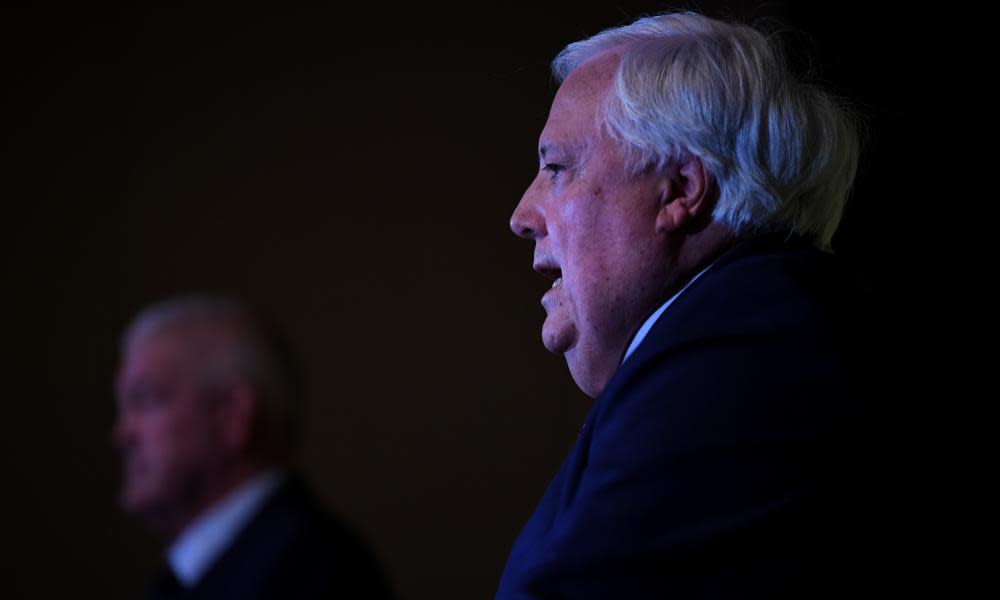Federal government pulls out of Clive Palmer legal challenge to coronavirus state border closure

Scott Morrison has ended the federal government’s involvement in Clive Palmer’s high court case challenging Western Australia’s border closure, amid rising fears over the Covid-19 outbreak in Victoria.
With Victoria poised to announce tougher lockdown measures aimed at reducing community transmission of the virus, the prime minister has written to the WA premier to reveal he is shifting his position – in part because the pandemic “has worsened since these matters were first brought to the high court”.
WA and several other states that imposed tough restrictions to reduce interstate travel have been at odds with the federal government for months, but in recent weeks Morrison has offered support to border measures between New South Wales and Victoria, and in the new letter he said he understood WA and others had acted “in good faith”.
Morrison acknowledged “decisions taken early in the outbreak of the pandemic were made with the best of intentions and in necessary haste” and the states had acted “on the basis of what was considered at a time of great uncertainty to be in the best health interests of Australians”.
In his letter to the WA premier, Mark McGowan, the prime minister emphasised that the commonwealth had not initiated the legal proceedings against the WA border measure but had intervened because section 92 of the constitution required “absolutely free” movement among the states.
“While taking our constitutional responsibilities seriously in seeking to respect established conventions, I also accept that recent events in the eastern states, especially Victoria, are creating real concerns to residents in other states less impacted,” Morrison wrote in the letter, sent on Saturday.
“I do not wish to see these concerns further exacerbated in Western Australia.”
Morrison said he had “taken into account the changed state of the pandemic that has worsened since these matters were first brought to the high court, the high level of concern regarding public health in the Western Australian community, and our desire to work with you cooperatively on a constitutionally sustainable way forward”.
On that basis, Morrison said: “I consider, on balance, that we must set aside the normal convention in these circumstances and not continue the Commonwealth’s participation in this case.”
Morrison said he was not requesting WA change its current border settings, because making any substantive amendments at the current time “would give rise to significant and unnecessary public concern”.
But the prime minister urged McGowan to work with him “to minimise constitutional risk so as to ensure that the necessary health protections in place can remain in place for as long as required”.
The letter was sent one day after the federal attorney general, Christian Porter, said “it would be highly unusual if the commonwealth didn’t intervene” in the case.
Porter was making the point on Friday that the WA litigation would continue with or without the commonwealth’s involvement. He told reporters the commonwealth had intervened in the WA court case “to assist the court” and was “trying to put a moderate middle ground here”.
Porter had argued that “the harder and more uncompromising and the [state] border approach, the more risk there is that it will be found unconstitutional”.
McGowan said he was grateful the federal government had pulled out of the case, and he called on Palmer to do the same.
“Obviously this was a very unfortunate episode but we’re proceeding on the basis the border will stay in place and we will fight Mr Palmer in the high court,” McGowan told reporters.
“He [Palmer] is showing himself at this point in time to be Australia’s greatest egomaniac and I just ask him: time to listen - withdraw your case.”
Meanwhile, two high court cases seeking to overturn the Queensland border closure backed by Palmer and Pauline Hanson’s One Nation – which were also expected to trigger a commonwealth intervention – were dropped last month. McGowan had been calling on the commonwealth to withdraw from the WA case.
In the letter on Saturday, Morrison urged McGowan to adopt four principles “to guide our future action”, including that states not “act arbitrarily or indiscriminately” in restricting movements.
The other principles include that the states consult with the federal government and other affected states – particularly those sharing land borders – when they consider it necessary to restrict movement across borders. Morrison said nationally consistent administrative arrangements should be introduced to minimise disruption.
Related: Covid-19 commission grants communications contract to firm headed by ex-Liberal staffers
With the Victorian premier, Daniel Andrews, due to announce the details of stage four lockdown measures on Sunday afternoon, the federal education minister, Dan Tehan, indicated the Morrison government would support additional measures to try to reduce community transmission in Victoria.
“There’s no question that these are very difficult times in Victoria at the moment and I think that everyone wants to see us get on top of this second wave and it’s absolutely vital for the nation that we do this,” Tehan told Sky News.
The shadow treasurer, Jim Chalmers, told the ABC’s Insiders program the concerning developments in Victoria should prompt a rethink of the Coalition’s plan to reduce the rate of the jobkeeper wage subsidy from September.

 Yahoo News
Yahoo News 
